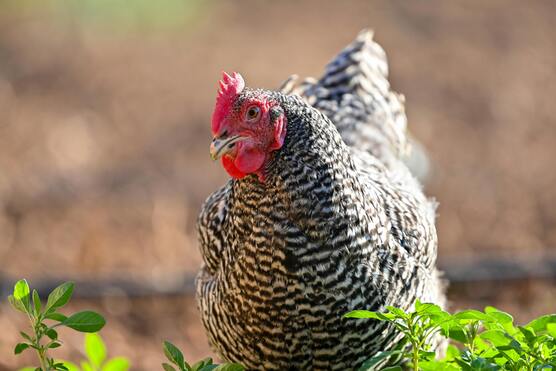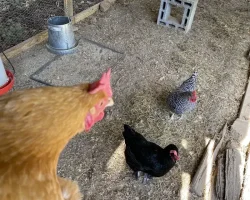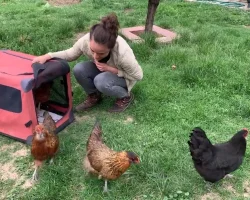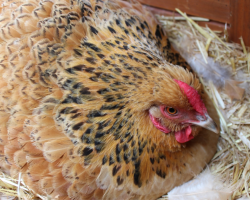More and more people are discovering the joys of raising chickens for eggs. It’s a trend that’s clucking its way across the country, and it’s not hard to see why.
But before you jump into the coop and start keeping chickens, it’s important to realize that raising a healthy and happy flock requires knowledge, commitment, and a bit of preparation.
So if you’re ready to embrace the joys (and responsibilities) of chicken parenthood, let’s get started!
Why Keep Chickens?
Fresh eggs, natural pest control, and endless entertainment are just a few of the obvious benefits these feathered friends bring.
But raising chickens is about way more than that. These cluckers are the best pets! With their quirky personalities and surprising intelligence, they have a way of becoming part of the family.
I love watching them go about their day, whether they’re “munching on fallen apples”, taking a hilarious dust bath, or just clucking and chatting with each other. Every day is an adventure with these goofy birds!
But it’s not always sunshine and rainbows. I’ve definitely had my share of “gritty realities” with chicken-keeping. There will be poop, there will be unexpected challenges, and yes, there will be expenses.
So, before you bring home your first flock, ask yourself these important questions and make sure you’re ready for the commitment.
Which Chicken breeds Would Be Right For You?
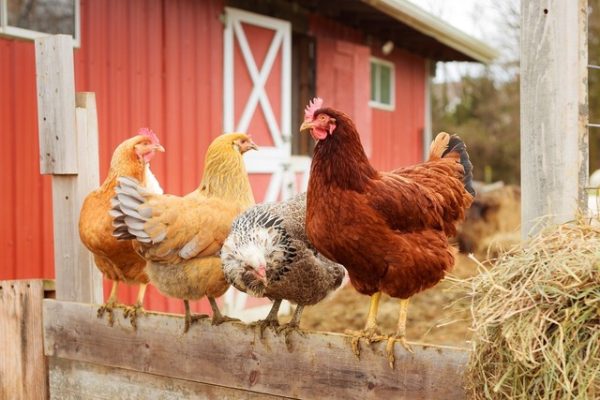
Which came first, the chicken or the egg? Well, the answer for your backyard flock is rather simple: it’s gotta be the chicken! Picking your first set of chickens is egg-citing, but with so many options, it can also be overwhelming.
Take some time to think about what you really want from your cluckers.
If fresh eggs are your priority, you’ll want to choose breeds known for their egg-laying abilities, like Rhode Island Reds or Leghorns. Or if you’re looking for a balance of both eggs and meat, dual-purpose breeds like Plymouth Rocks might be the way to go.
Of course, if you’re just in it for fun and companionship, then the sky’s the limit. You’ll probably love show favorites like Silkies or Polish chickens, famous for their unique looks and personalities.
Beyond breed, consider things like the size of your backyard, the temperament and longevity of the flock, as well as your goals for egg production and egg size.
The number of chickens you start with will depend on the space you have and how much care you can provide. But generally, it’s advisable to start with three to six hens that have calm, adaptable personalities, and minimal environmental needs.
Even though raising little chicks sounds more rewarding, for your first flock, you’ll most likely be better off with older birds that require lesser care and start laying soon.
A little research and knowing the right questions to ask can make all the difference in selecting the best chicken breed for your flock.
Preparing the Chicken Coop and run
Before your cluckers arrive, they will need a place to live. Their home needs to be safe and comfy for them to roost, lay eggs, and find shelter from extreme weather.
Chickens can handle cold temperatures pretty well, but they still need protection from freezing winds and snow. And in the summer, they’ll need a place to cool off and find some shade.
Consider these key factors when setting up your chicken coop:
- Size: Allow 2-3 square feet (or 0.2-0.3 square meter) of coop space per chicken, and 8-10 square feet (or 0.7-0.9 square meter) in an outdoor run.
- Bedding: Cover the coop floor with absorbent bedding to soak up droppings and keep the coop clean and dry. Good options include pine shavings, straw, or shredded paper.
- Ventilation: Ensure good airflow without drafts to keep the coop fresh and prevent respiratory issues. Carefully position the gaps to allow air to circulate, without creating a direct breeze on your chickens.
- Roosting bars: Chickens like to sleep off the ground, so put some wooden bars inside the coop for them to perch on. Make sure the roosting bars are smooth and sturdy, and position them at different heights to accommodate your flock’s pecking order.
- Nesting boxes: These are where your hens will lay their eggs. One box for every 3-4 hens is usually enough. Provide comfortable nesting boxes filled with soft, clean bedding.
- Keeping predators out: Make sure the coop is made of strong materials and has secure latches to keep raccoons, foxes, and other critters from getting in. Reinforce any weak points with hardware cloth, and consider burying wire mesh around the perimeter of the coop to prevent predators from digging underneath.
Buy and Build your own chicken coop
If you like DIY projects, building a coop can be fun! You can find lots of free chicken coop plans online so you don’t have to start from scratch. Just remember that your first attempt won’t be perfect, so be ready for some trial and error.
If you’re short on time though, you can always buy a (pre-assembled) chicken coop kit, which includes all the materials and instructions you need to build it yourself. There are tons of great options out there, from simple A-frame designs to elaborate chicken mansions. So you can find something that fits your space and budget.
When it comes to materials, wooden coops are a classic choice. For example, those of the Chicken Coop Company are sturdy and of good quality. They blend well into your backyard, provide natural insulation, and have that cozy, rustic charm. On the other hand, plastic coops are becoming more popular for their durability and ease of maintenance. They’re lightweight, easy to clean, and some types (like the Omlet chicken coop) can even be moved around effortlessly. If predator protection is a priority for you, metal coops offer the best security and are built to last, though they’re less common, heavy and quite expensive.
Whichever way you go, just make sure your coop is big enough for your flock and has all the important features we talked about above.
Where should you put the coop?
Pick a spot that gets some shade, especially in the summer. Or even better, you could get a chicken tractor (moveable chicken coop), and relocate it throughout the year. That way, you can follow the shade and give your chickens fresh grass to peck at.
You’ll also want to be able to easily reach inside to collect eggs and clean the coop.
Don’t Forget the Run
Most chickens need some outdoor space to roam and explore. This is called a “run.” It should be attached to the coop and enclosed by a fence to keep your chickens safe.
Each chicken will need about 8-10 square feet (or 0.7-0.9 square meter) of space in the run.
Feeding Your Flock
Just like us, chickens need a mix of healthy foods to give them energy and keep them clucking along.
The easiest way to make sure your flock gets all the nutrients they need is to give them commercial chicken feed. This is like their main course, and it usually comes in the form of pellets or crumbles. Look for feed that’s specifically formulated for laying hens.
Of course, everyone loves a little treat now and then, and chickens are no exception! You can give them occasional goodies like:
- Mealworms (chickens go crazy for these)
- Fruits (apple slices, berries)
- Veggies (lettuce, spinach)
Just remember that treats should be just that… Treats! Don’t overdo it, as they shouldn’t replace their main diet of commercial feed.
Other Essentials
Here are a few other things to keep in mind when feeding your flock:
- Grit: Chickens don’t have teeth, so they need grit to help them grind up their food. You can buy grit at most feed stores. But it’s important to choose the right type of chicken grit based on your chickens’ age and whether they’re laying or not.
- Water: Always make sure your chickens have plenty of fresh, clean water, especially during hot weather.
- Feeders: Use a feeder that keeps the feed clean and prevents waste. A hanging feeder or a treadle feeder are good options to keep things tidy and prevent your chickens from making a clucking mess!
- Storage: Keep your feed in a sealed container to keep it fresh and prevent pests from getting into it.
Routines for Basic Chicken Care
Taking care of chickens does require responsibility, but setting up routines will make it much more manageable.
Think of it like creating a chore chart. By following a regular schedule of tasks, you can make sure your flock stays happy, healthy, and productive.
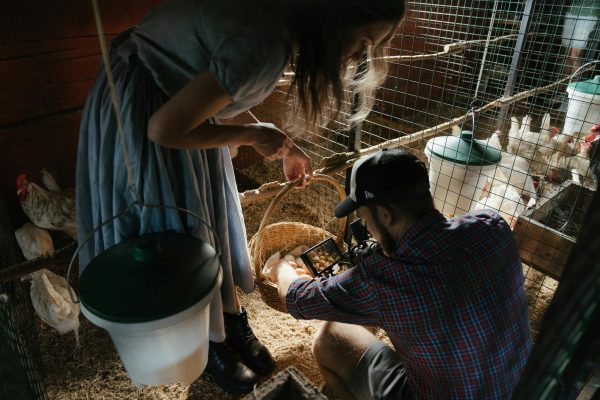
Daily Chores
- Morning routine: Let your chickens out of their coop each morning. Check their food and water, and make sure everyone looks healthy and happy. If you have time, wait an hour or so until your hens have all laid eggs and collect them right away. This prevents your hens from becoming broody.
- Late afternoon: If you like, you can offer your chickens a little treat. Your chickens will love leftover vegetable scraps, mixed corn or a little extra commercial feed. Be careful not to overdo it! it is a little extra treat, not a necessity.
- Evening routine: Collect any remaining eggs from the nesting boxes. Also check other places, like the run, just in case. Clear away any leftover food, and then shut the chickens back in their coop for the night to keep them safe from predators. Preferably, lock up your chickens at dusk but before dark.
Weekly Chores
- Coop cleaning: Clean out the coop at least once a week. Scrape off perches and other surfaces, remove the old bedding, and replace it with fresh material. You can use things like wood shavings, straw, or shredded paper. Scrub your drinkers and feeders with hot water and soap.
- Health checks: Take a close look at your chickens every week. Check their feathers, legs, and eyes to make sure they look healthy.
Seasonal Chores
- Summer care: Make sure your chickens have plenty of shade and fresh water during hot weather. You can even freeze treats like berries or watermelon for a refreshing snack.
- Winter care: In the winter, make sure the coop is dry and draft-free. You might need to add extra bedding to keep your chickens warm.
A Few Extra Tips
- Dust baths: Chickens love to take dust baths! This helps them keep clean and get rid of parasites. Provide a dust bath area with fine soil or sand.
- Health care: Just like any pet, chickens can sometimes get sick. Learn about common chicken illnesses so you can spot any problems early on.
- Deworming: You’ll need to deworm your chickens regularly to keep them healthy. You can get deworming medication from your vet or a feed store.
Keeping Your Flock Healthy
Most chicken health problems can be prevented with a bit of knowledge and effort. Being proactive with a “wellness plan” for your flock can save you a lot of trouble.
Preventative Care
- Clean living: Remove droppings and soiled bedding every 1-2 days. Plan for a thorough cleaning once a week. Clean more frequently in hot weather to prevent flystrike and the build-up of bacteria. If your birds have an infection, also disinfect your feeders and drinkers. First, scrub them with hot water and soap. Second, rinse them with water and let them dry completely. Third, disinfect with a poultry-safe disinfectant, such as a 1:1 vinegar-water solution, a bleach mixture (1 tablespoon of bleach per gallon of water), or a commercial poultry disinfectant.
- Food and water check: Always provide fresh, clean water and make sure the feed is free of mold or spoilage. Store feed in airtight containers to keep it fresh and pest-free.
- Space to roam: Overcrowding can lead to stress, aggression, and a higher risk of disease transmission. So give your chickens plenty of space to move around in both their coop and run.
In addition to the basics above, get to know your chickens so you can quickly notice if something seems off. Look out for changes in their behavior, appetite, or droppings.
Common Health Issues
Even with the best care, chickens do end up getting sick. Be sure to watch out for:
- Pesky parasites: Mites, lice, and worms are common in chickens. Regular dust baths and deworming treatments can help prevent infestations.
- Breathing troubles: Colds and other respiratory illnesses can spread quickly in a flock. Make sure the coop has good ventilation to prevent these issues.
- Egg-laying issues: Egg binding (when an egg gets stuck inside a hen) and soft egg shells are common problems. A balanced diet with enough (but not too much) calcium and other nutrients helps to prevent these issues.
- Injuries and stress: Chickens may also face injuries from falls or encounters with predators.
With a little preventative care and quick action when problems arise, you can help your flock stay healthy.
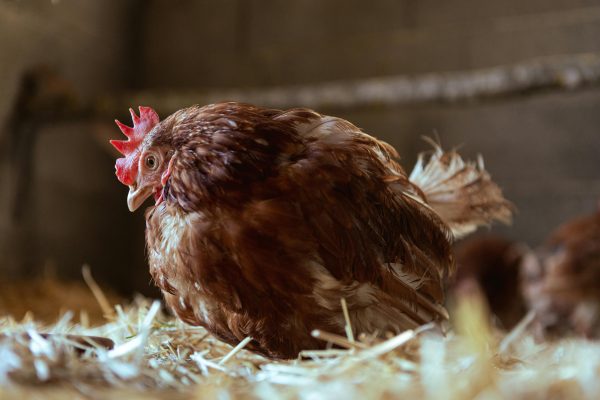
FAQs for New Chicken Keepers
Are chickens noisy?
Hens generally aren’t too noisy, except for the occasional excited cackle when they lay an egg. Roosters, on the other hand, can be quite loud with their crowing.
Do I need a rooster for my hens to lay eggs?
Nope! Hens lay eggs whether or not a rooster is around. Roosters are only needed if you want fertilized eggs to hatch chicks.
How much time does it take to care for chickens?
Once you get into a routine, caring for chickens usually takes about 15-30 minutes per day. This includes things like feeding, watering, collecting eggs, and doing a quick coop check.
How often would I need to clean the coop?
Clean the coop at least once a week, and more often during hot weather. A well-maintained coop shouldn’t have a strong odor.
Can I let my chickens roam free in my yard?
It depends. Free-ranging chickens can be great for pest control and fertilizing your yard, but they can also damage your garden and landscaping. If you have a fenced-in yard and your neighbors don’t mind, free-ranging can be a good option.
Do chickens need any special care in different seasons?
Yes, you’ll need to make some adjustments for different weather conditions. In the summer, provide extra shade and water. In the winter, make sure the coop is dry and draft-free.
Final Thoughts
Raising chickens in your backyard is a pretty cool experience, but it definitely involves more than just throwing some feed in a bowl and hoping for the best. Just like any pet, chickens need regular check-ups and some extra love to stay happy and healthy. It might seem like a lot at first, but trust me, it gets easier with time.
So go for it, create your own backyard chicken clucktopia, and enjoy the journey!

